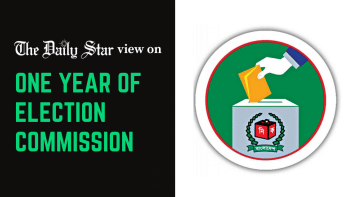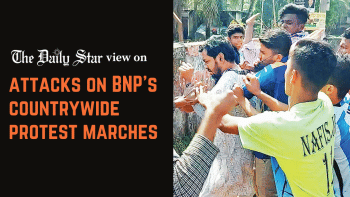EC must do more to empower voters

This week marks one year of the incumbent Election Commission (EC) in office, which also coincided with the National Voters' Day. Far from being an occasion for celebration, however, the reigning mood appears to be one of trepidation, with the general election less than a year away. The biggest worry is, will people again be denied the opportunity to exercise their franchise? As things stand, it seems unlikely that the EC will succeed in holding free and fair elections. Despite all the talk of creating a level playing field for the political parties, so far, it has failed to make any progress in that respect. The ruling Awami League has routinely gotten away with obstructing political programmes held by BNP in the most blatant of ways.
While demands made by the ruling party have been given priority over the concerns expressed by the opposition – for example, over the use of electronic voting machines (EVMs) – another factor that is of great concern is the negligible involvement of voters in the election process. Tussles between the main political parties have dominated the election narrative ever since this EC took over a year ago, just like they did during the tenures of the previous two ECs. And the role and space for voters have continued to shrink to historic lows. The appalling voter turnout in recent local elections and parliamentary by-polls illustrated the lack of confidence in the EC's ability – partly due to the partisan role of the administration and partly due to its own unwillingness to take firm action – to oversee a fair transfer of power. That, of course, should come as no surprise after what happened during the last two general elections of 2014 and 2018.
Besides the endless political controversies, harassment and intimidation of voters, denying them the chance to vote for their preferred candidates and, in some cases, forcing them to vote for specific candidates, fraudulent voting in secret booths, ballot-box stuffing, and many other irregularities during the last two elections have all but destroyed our democratic process, as well as voters' willingness to participate in such farcical exercises. Unfortunately, despite initial promise, the current EC has been unable to reverse that perception with its questionable handling of election-related irregularities. Many have rightly raised the question that if the EC cannot control the administration and law enforcement personnel during local elections, what hope does it have of doing so during the general elections where the stakes are much higher?
The EC itself has done little to alleviate such concerns. And the recent statement by the chief election commissioner – that political parties should participate in the election of their own volition, as the EC cannot do anything more to persuade them – is deeply worrying. How can the EC expect that when the conditions it has created so far are nowhere near satisfactory? For the sake of our democracy – or whatever is left of it anyway – the EC must do more to fulfil its constitutional mandate. It must ensure that power is returned to the people after two controversial and largely non-participatory elections.


 For all latest news, follow The Daily Star's Google News channel.
For all latest news, follow The Daily Star's Google News channel. 








Comments